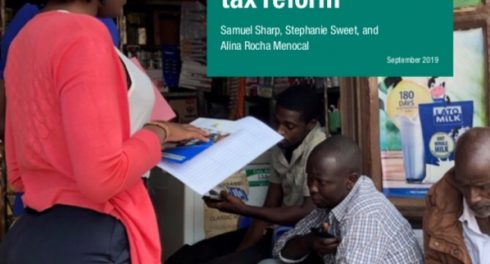Highlights:
- Belt loosening
- Stirring the walking dead of donor data
- From the courts to the street
- Billionaire fight or flight? Neither it seems
- When national = personal
- Face of effective foundations
- TAI spotlight: From ten years of U.S. civic tech to social movements
In case you missed it…
Belt loosening
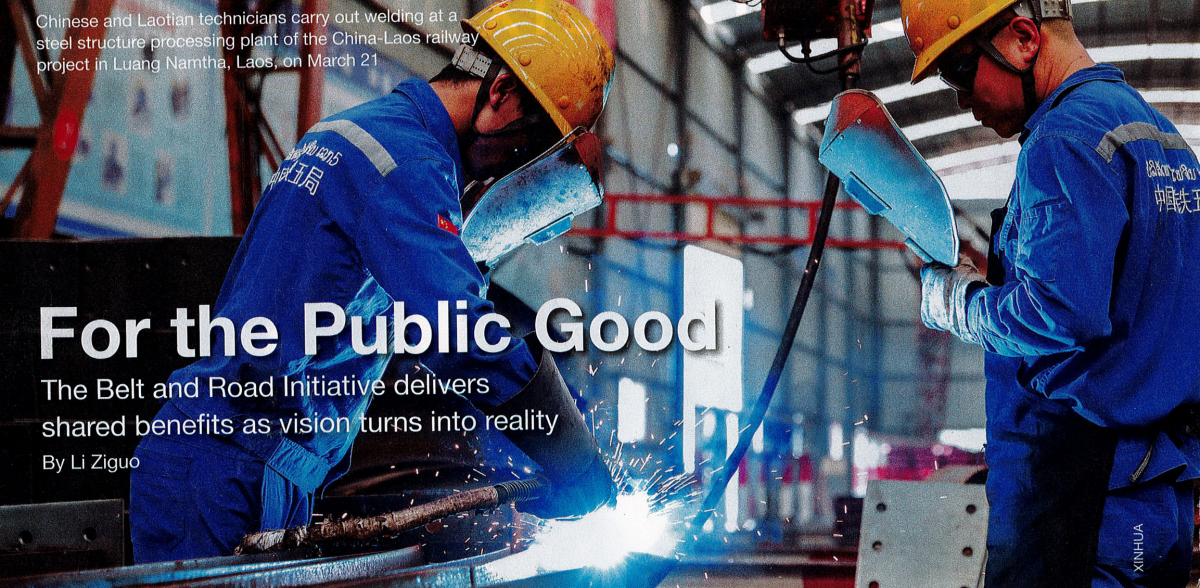 Photo: Liz Ziguo
Photo: Liz Ziguo
This past week saw China’s leadership pulling out all the stops to shift perceptions of the Belt Road Initiative at their second Belt and Road Forum. They were certainly busy producing deliverables, unveiling a bewildering 283 results in six categories, including domestic Chinese initiatives, bilateral and multilateral agreements and cooperation mechanisms, investment and financing projects, and projects by local authorities and enterprises. In addition to gathering dignitaries from around the world and speaking directly to the international press, there were adverts in major publications emphasizing the public good benefits of the initiative and some striking new language in official reports for open government watchers. There is a noticeable new emphasis on investment as “a road for clean government” and even as “Offering a Chinese approach to reforming the current global governance system.” The language on propelling “interaction between global governance, security, and development” is not so far from what you can read in DFID’s recent governance position paper and other OECD donor documentation. It will be interesting to see what the rhetorical shifts translate into on the ground. David Malpass, new World Bank boss, is likely to be skeptical as he calls for China to be more open on its lending to lead to better quality projects.
Belt and Road investments extend to the telecoms sector, and that may prove no bad thing for those who care about uptake of data and citizen engagement in an increasingly digital world. See the latest figures for the price of mobile data across Africa. It would be interesting to compare with national usage of government data. Should funders who care about good governance be doing more to push down data prices?
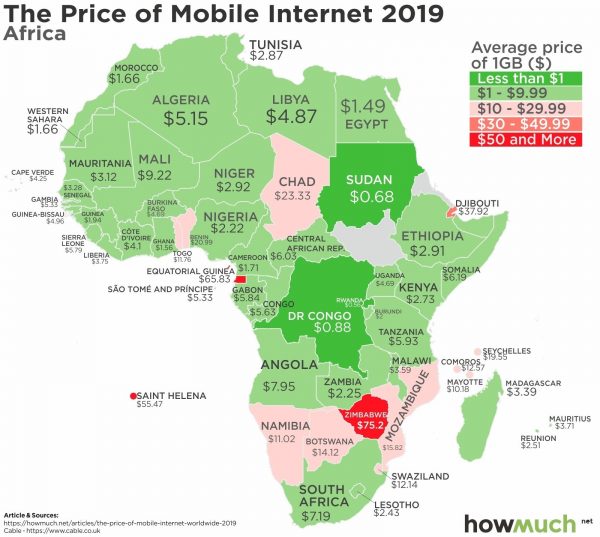
Los Angeles is hoping to set an example of building better connections with citizens through easy data access – 1100 datasets are already online, including on more sensitive topics, such as policing. Additionally, the city is investing new applications for citizens to make requests of city government.
Stirring the walking dead of donor data
TAI has recently been struggling to use International Aid Transparency Initiative (IATI) data to map governance of extractive industries investment. We have even less hair now as a result, so welcome any efforts at improving effectiveness of donor funding information. To that end, Development Getaway interviewed Madagascar officials on how they use IATI data to improve their country’s aid management. This includes collecting project information on donors who lack a Madagascar country office, streamlining reporting from donors to the Government’s Aid Management Platform, and identifying potential new donors based on their existing funding patterns.
Why should we care? Jan Van de Poel explains why aid reporting rules matter for effective development. He emphasizes that the focus should be on reforming the reporting rules. Meanwhile, Publish what you Fund recently ran a workshop with UK government agencies on the transparency of UK aid and how more transparency can lead to better outcomes. Read more how they will be monitoring and supporting Official Development Assistance spending departments to improve aid transparency.
Feedback can provide important data points (although not ones that every organization acts on). However, Accountability Lab and Feedback Labs argue that feedback should be viewed as more than just data. They make the case for feedback as a relationship and suggest it needs to be marketed that way. They further note that feedback must be personally beneficial to actors at every level in development work.
Last week, we featured several stories raising concerns about machine learning and artificial intelligence (AI) uses – from lack of diversity to weak oversight. Now, MIT has created a term for our collective worries about AI: “Machine behaviour.” Like the name? Send us your alternatives on Twitter.
Long read
 Artificial Intelligence and Human Rights by Eileen Donahoe and Megan MacDuffee Metzger
Artificial Intelligence and Human Rights by Eileen Donahoe and Megan MacDuffee Metzger
Donahoe and MacDuffee Metzger make the case for a global governance framework for addressing the human rights concerns around artificial intelligence.
From the courts to the street
Litigation to bring about social change and enforce civil and human rights – strategic litigation – is gaining momentum nowadays (and is a target of increased TAI member funding). César Rodríguez-Garavito notes that its impact depends on the degree of citizens’ mobilization. He shares lessons learned from the Amazon litigation on climate change and deforestation. He argues that while litigation is an important step to destabilizing the structural status quo, the burden will fall on youth to mobilize to ensure real action follows legal decisions.
Such litigation becomes harder where government repression is more severe, so how can funders help grantees navigate such circumstances? David Gordon and Chris Allan highlight how environmental and conservation funders are finding new ways and approaches to support CSOs including supporting physical and digital security, investing in women leaders and resilient funding practices, and, yes, defending the rule of law. We look forward to a chance to compare notes with good governance funders. Hewlett’s Ruth Levine is also thinking about new ways for funders to support social movements to help bridge the gap between these movements and policymaking (for more, see the TAI Spotlight).
Of course, the dangers facing activists extend even more so to journalists. The killers of Daphne Caruana Galizia, who helped investigate Maltese links to corruption, have not yet been brought to justice. His son argues that without free journalism there can be no democracy.
That point no doubt resonates with Petra Blum, who makes the case for the media’s role in promoting fiscal transparency. (This blog is part of our ongoing Fiscal Futures series with International Budget Partnership and Carnegie Endowment). Petra observes that topics such as fiscal policy, accountability, and fiscal justice do not usually generate sweeping media coverage, but that exposés like the Panama Papers show the power of journalistic contributions to the greater fiscal transparency cause. She argues that the lesson for journalists is to make these topics personal by focusing on how lack of fiscal accountability is driving inequality and poverty. She points to Rutger Bregman’s viral Davos moment as a good example of personal storytelling around the issue of tax administration.
Billionaire fight or flight? Neither it seems
Heather Scoffield, the economics columnist for The Star, demonstrates the case of the Canadian government that raised taxes on the wealthiest 1%. Her analysis suggests they didn’t flee the country but rather stayed put and went about their business as usual, increasing their share of the country’s total income tax by 0.9 percentage points.
Those taxed might welcome a sense of where their contributions go once in government coffers at which point budget transparency comes in handy. BudgIT Nigeria shares updates on how they are strengthening budget transparency, civic engagement, and accountability in Nigeria. Recently, they’ve been simplifying budget analysis for citizens, calling out suspicious or frivolous line items in the proposed budget, scaling up work on state budgets, and successfully advocating for public dissemination of the National Assembly’s budget.
Do you know the sessions, workshops, and discussions in store for the upcoming Open Government Partnership Global Summit? Check out the draft agenda. How is your country advancing the open government agenda? Ukraine has adopted some new approaches to leveraging the open government commitments as conversations during the recent open gov week covered an unprecedentedly diverse set of issues far beyond the 17 commitments in the OGP action plan.
Meanwhile, Adva Saldinger reports from the Financing for Development Forum on concern among experts about meeting SDG funding needs. They say there’s been an alarming lack of progress since the 2015 Addis Ababa Forum. Further, they identify that improving domestic resource mobilization and addressing illicit financial flows as the key avenues to address this financing gap. Forum participants are calling for going beyond commitments to taking concrete action, and hope to see major political initiatives launched at the High-level Dialogue on Financing for Development at this year’s UN General Assembly in September.
Finally, returning to the strategic litigation theme, in our last Weekly we highlighted how Kenya and Mauritius signed a new tax treaty. Watch here to understand why the Tax Justice Network challenged the previous double tax avoidance agreement.
Essential listening
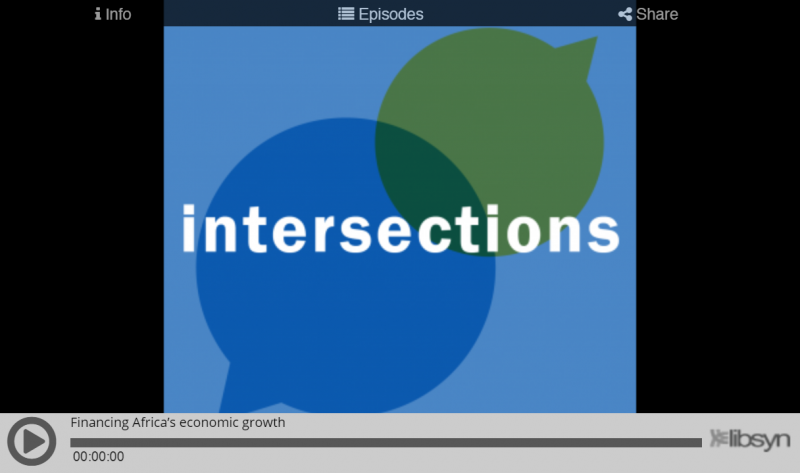 Why is there a rising national debt in sub-Saharan Africa? Brahima Sangafowa Coulibaly, director of Brookings’s Africa Growth Initiative, Lemma Senbet, and William E. Mayer examine the contributing factors on the final episode of Intersections. Listen Now!
Why is there a rising national debt in sub-Saharan Africa? Brahima Sangafowa Coulibaly, director of Brookings’s Africa Growth Initiative, Lemma Senbet, and William E. Mayer examine the contributing factors on the final episode of Intersections. Listen Now!
When national = personal
It seems Gambian ex-President, Yahya Jammeh, had an odd interpretation of the “national” in Gambia National Petroleum Corporation – treating it and other government entities as personal cash cows during his 22-year rule.
That points to a need for greater information and oversight that National Resource Governance Institute’s new National Oil Company (NOC) Database aims to help drive. TAI attended the global launch last week and got a sense of its coverage of NOC production, revenues, spending and transfers to government- 70,000 data points from 71 NOCs worldwide from 2011 to 2017. Perhaps what is most telling is what those data points do not include – too many state-owned enterprises fail to disclose information critical to the oversight of public assets and revenues. Couldn’t attend? Check out the launch webcast.
EITI, the London Metal Exchange (LME), and the OECD have come together to push for more transparency in mineral supply chains. LME will require all listed companies to undertake “Red Flag assessments” by 2024, which will include requiring producers to confirm that they have disclosed to data to all EITI member countries. Elsewhere, oil companies on the London Stock Exchange must now disclose their payments to governments – hardly seems revolutionary these days but good to see the Exchange keeping up with the times.
Long read
The report highlights the growing support among investors, businesses, and policymakers for greater public country-by-country reporting (CBCR) of certain financial information for multinational companies.
Face of effective foundations
What makes for effective foundations? Mario Morino and Lowell Weiss identify five core disciplines which they describe as bigger than “best practices.” They call them the fundamental building blocks for funders looking to be as effective as they are generous. Effective foundations have talented, empathetic leaders and exemplify a “growth mindset. They help grantees strengthen their organizations, not just programs and aim to cultivate strong, trusting relationships with grantees. Finally, they go to bat for their grantees with other funders. You can match these against your experience of TAI foundation members. Are we up to scratch?
Finally, what can governance programming learn from market systems? David Jacobstein makes the case for programming around democracy, human rights, and governance borrowing from market systems facilitation approaches which are promoting a dynamic, innovative, inclusive system that enables participants to solve their problems.
TAI spotlight
Ten years of U.S. civic tech | Luminate
Alissa Black and McKenzie Smith share findings from Dalberg’s assessment of the past decade of U.S. civic tech investing and implications for the field going forward.
Bolstering journalists to uncover corruption | Luminate
Laura Bacon explains their investment on Finance Uncovered, who equip journalists with skills to investigate corruption, money laundering, and tax abuse.
Closing the gap between social movements and policy change | Hewlett Foundation
Ruth Levine reflects on why it’s important to understand and engage constructively with people who are building and sustaining social movements – and what she’s learned from WIEGO.
Calls: Proposals, papers, speakers and course invites
- Fostering Latin America’s Next Generation of Feminist Leaders – May 3
- Young Feminist Leaders Fellowships: Open Society Foundations: May 3
- Fostering Latin America’s Next Generation of Feminist Leaders – May 3
- Open Society Foundation Call for Consultant: Anti-corruption Narratives – May 8
- 2019 Call for projects for Paris Peace Forum – May 13
- Call for Papers: The Global Asset Registry Workshop – May 15
- Call for Abstracts: MIT GOV/LAB 4th Political Behavior of Development Conference – May 15
- 4th Global Call for Proposals for CSOs and CSO Networks – May 15
- Crowdsourcing case studies for the Innovation Report for 2019 on Civil Society – May 31
On the calendar
- World Press Freedom Day 2019 – May 1-3, 2019 (Addis Ababa, Ethiopia)
- The CEP Conference – May 7-9, 2019 (Minneapolis, USA)
- Csv, conf, v4 – May 8-9, 2019 (Eliot Centre, Portland)
- 2019 Forum to Advance Women’s Leadership in the Global Development Sector – May 14, 2019 (Washington, DC)
- Collective Impact Forum Convening – May 14-16, 2019 (Chicago, USA)
- Policy Dialogue Day 2019 – May 22, 2019 (Gothenburg, Sweden)
- The 2019 Media Impact Forum: Radio Active Culture – May 23, 2019 (Philadelphia, USA)
- 2019 Open Government Partnership Global Summit – May 29-31, 2019 (Ottawa, Canada)
- Women Deliver 2019 Conference – June 3- 6, 2019 (Vancouver, Canada)
- RightsCon Tunis – June 11-14, 2019 (Tunis, Tunisia)
- InterAction Forum 2019 – June 11-13, 2019 (Washington, DC)
- Global Conference on Transparency Research – June 26 – 27, 2019 (Rio de Janeiro, Brazil)
- Tax Justice Network Conference 2019 – July 2 -3, 2019 (City, University of London, UK)
- ATI/ITC Tax and Development Conference 2019 – July 2 -4, 2019 (Berlin, Germany)
- Global Symposium (COPGS) on Citizenship, Governance, and Accountability in Health – October 15-18, 2019 (New Delhi, India)
- What Works Global Summit 2019: Building Evidence – October 16 – 18, 2019 (Mexico City, Mexico)
- Global Perspectives 2019 – October 29 – November 1, 2019 (Addis Ababa, Ethiopia)
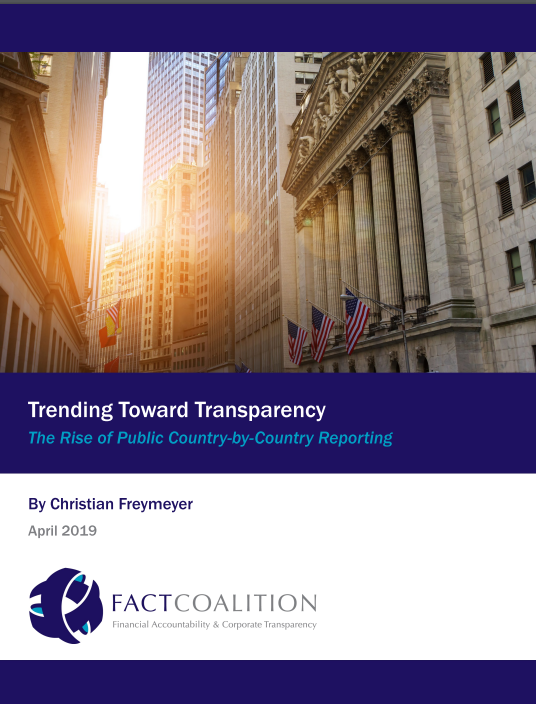 Trending Toward Transparency: The Rise of Public Country-by-Country Reporting by the Financial Accountability and Corporate Transparency (FACT) Coalition
Trending Toward Transparency: The Rise of Public Country-by-Country Reporting by the Financial Accountability and Corporate Transparency (FACT) Coalition